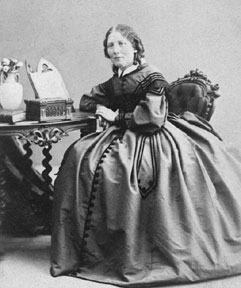Sob Story
December 11th, 2010
I’ve just finished reading Uncle Tom’s Cabin; Or, Life Among the Lowly by Harriet Beecher Stowe, and am I glad it’s over! Not that I didn’t find Mrs. Stowe’s legendary narrative riveting, but I couldn’t stop crying. It was particularly awkward as I do a lot of my reading in public; walking back and forth to the museum where I work (not as difficult or as dangerous as it sounds), or sitting in cafes on Saturday or Sunday mornings. People turned to look at me as I stumbled down the street, tears streaming down my face, trying to hold my book up straight.
I was inspired to read Uncle Tom in mid November when I received a broadsheet from Metropolitan Playhouse Theatre, a dear little off-off Broadway troupe that specializes in presenting historic and historically themed plays, announcing their production of Uncle Tom’s Cabin, as dramatized by George L. Aiken in 1852 (practically minutes after the book’s publication). So, being at loose ends in a literary sense, and always preferring to read the book first, I pulled it off the shelf and dug in. After the first few chapters, I decided I had better not go to the play, as I would surely disgrace myself by bawling through every act.

Harriet Beecher Stowe
Published in 1852, nearly 10 years before the American Civil War began, Harriet Beecher Stowe’s best-known novel was also the best selling book of the decade. I’ve already shown that I found the story moving, the characters sympathetic. And while many of its well-intentioned sentiments are abhorrent to our modern understanding of racial equality, when you consider the time in which it was written, it is a masterpiece. Mrs. Stowe, born of an incredibly influential and clever family that also included the Rev. Henry Ward Beecher, authoress Catherine Beecher, and female suffragette Isabella Beecher Hooker, sparked the nation’s sympathy for the abolitionist cause in a way that no amount of political or theological debate could possibly do. Then, as today, ordinary people need to be affected emotionally before they can overcome the natural inertia and horror of inconvenience that keeps inequitable — or even evil — customs so firmly entrenched.
As for the novel itself, it’s certainly not the best I’ve ever read. The balance between the dual plot lines gives out halfway through, and the way they link back together in the end seems trite. The characters tend towards the grotesque, and occasionally exhibit evidence of Mrs. Stowe’s Calvinist upbringing. Many of the scenes are overdone — which isn’t to say I was immune to their pathos by any means. The strong moral and religious overtones didn’t bother me, as I am used to reading literature of this period, which is notoriously rife with such things. However I can see where they might put off the average 21st century reader.
I also enjoyed the casual tidbits describing this or that about domestic life that are always the reward of reading a mid-19th century book written by a woman. Allusions that someone would take as mere description 160 years ago become priceless vernacular evidence of historic customs to the social historian.
Final verdict — if you are interested in a first-hand account of slavery, read Frederick Douglass. If you like compelling stories written in the mid-19th century, read the Brontes. But if you will insist on Uncle Tom’s Cabin, let me first offer you the loan of my handkerchief.
P.S. This is VERY politically incorrect, but I couldn’t help enjoying Tex Avery’s version of Uncle Tom.

Dear Mrs. Ulz,
I found your brief review of Mrs. Stowe’s work very well written. I was unfamiliar with her famous family, something you shed some light on. Was there any one particular episode in the novel that struck a chord with you more than others? Just curious.
S.Sobek
Many thanks! I am a big Catherine Beecher fan (she wrote household manuals that are a veritable gold mine of information about domestic life) and read a biography of the entire family a few years back. Fascinating story, though rather grim in parts.
I’m sorry to say I didn’t practice much discretion in my empathy — I started crying when Eliza crossed the ice, and didn’t stop until they left for Liberia…
Oh my…how brilliantly clear you’re writing. Please please please share some more. It is inspiring, uplifting and just damn good.
Gosh!
[…] reading Uncle Tom’s Cabin — my most recent literary accomplishment — I was struck by the way some of the coarser […]